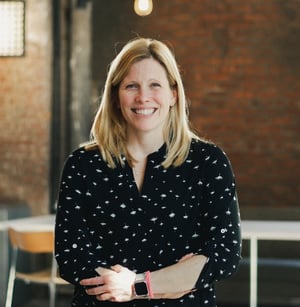Mentorship Spotlight: Ashley Harris, Havas Media
In this blog series to commemorate National Mentoring Month, we are celebrating some of our incredible mentors in the Data Science for All program.
 Ashley Harris is EVP, Head of Analytics and Data Science at Havas Media, and a mentor for DS4A / Empowerment. She answered a few questions for us about her experience, career advice and creating more inclusive workplaces.
Ashley Harris is EVP, Head of Analytics and Data Science at Havas Media, and a mentor for DS4A / Empowerment. She answered a few questions for us about her experience, career advice and creating more inclusive workplaces.
Tell us about a pivotal moment in your career: what was the backdrop, what did you do, what did you learn?
One of the things I love most about working for an agency is that agencies are constantly trying to push the envelope in terms of innovation and leading-edge approaches. However, it was also one of the most scary aspects in my early days as an analyst. Wanting to deliver a new robust approach to a large client, I recommended a predictive modeling approach that at the time was mainly limited to educational studies. It was completely nerve wracking when the time went to deploy this new approach for the client—not so much the fear of failure since I built in a conservative test plan but more so the personal deflation of knowing how much energy I had put into learning and building something new. Luckily, it worked and several years later it was still their best performing response model. For me, it taught me to continue to press for innovation and change. Even when something is performing well, I strive to come up with alternative approaches which also continues to make the work interesting.
Who were your mentors and role models when you were starting out? What’s the best professional advice you received?
Early on in my career, I was the only the data scientist at an organization so my professional mentors were often leaders in marketing and strategy roles. Fortunately, those mentors shaped my strategic and soft skills into the role I play today which is focused on developing data-driven solutions for non-technical audiences that drive business outcomes. I also learned some very valuable lessons around project management and delivery. My favorite advice was to always ask for 3 things at the beginning of a project: who the audience is for a model/analysis, how success will be evaluated and when it’s absolutely needed by. It’s a simple framework but I’m often surprised at the projects that kick off without knowing these 3 things, and subsequently under-deliver on expectations.
Have you gained from mentoring and coaching - both professionally and personally? Did anything surprise you when you started mentoring?
I’m always surprised about how much I grow when I’m mentoring. It often leads to a lot of self-awareness as you think of how you can apply your experience to guide others. Specific to mentoring for DS4A, I have been amazed at the energy and technical intelligence these Fellows bring. From a data science standpoint, they already have ideas and approaches that are well beyond what mine where when I first started.
Can you give us an example of how data skills are increasingly needed in your role and business?
The vast amount of marketing data, especially in digital media, has driven the need for Python/SQL in my industry. However, as the industry moves toward greater data privacy, top partners such as Google no longer share the vast amount of information outside of their ecosystem. As a result, holistic analysis is no longer just about being able to process/analyze large datasets but now requires creative statistical approaches that can bridge analysis across disparate data ecosystems.
You’ll be mentoring a group of Fellows in our inaugural cohort in the Data Science for All/ Empowerment program, an initiative to create equal opportunities to access the data-driven jobs of tomorrow. What can individuals and organizations do to help create more diverse and inclusive workplaces?
I wish that I knew the perfect answer here--diverse environments are critical for not only work culture but also the quality of work. Leaders need to actively embrace DEI and ensure that is the backbone of corporate culture. It shouldn’t just be an HR initiative but needs to be tied into the entire org so that each department has initiatives that drive greater diversity and inclusion. There also needs to be accountability here so it’s important to plan how successful program will be measured.
Specific to hiring, I believe there is an over-emphasis on work experience which perpetuates the problem in data-driven jobs--the best people I have worked with have characteristics that have little to do with how long they have been in the industry or what school they went to.





